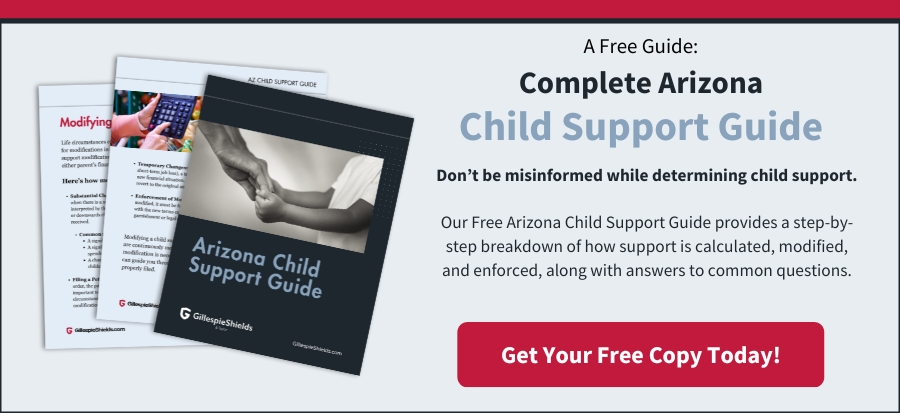 When a couple shares a child and separates, both parents have a legal duty to ensure the child has the resources necessary to grow and thrive. In Arizona, parents who do not hold primary custody must provide regular payments to uphold their share of this burden. These payments, termed child support payments, are a legal requirement to fund necessities such as food, clothing, medical expenses, education expenses, and more. Child support payments are ordered by the Arizona Family Court according to a formula created by the state, regulated by the Arizona Division of Child Support Services (DCSS), and can be enforced by the court or the Arizona Department of Economic Security. While this system was developed to ensure fair payments that consider the financial circumstances of the parents and ensure the benefit of the child, child support laws can be cumbersome and complicated. As a result, many parents become overwhelmed when facing the prospect of determining regular payments that must provide for their child’s welfare over a number of years. Whether you are a parent receiving payments or making them, child support ensures that both parents are meeting the needs of the child. The dedicated child support attorneys at Gillespie, Shields & Taylor are committed to empowering Arizona parents within the child support process. This guide can help you understand the most important aspects of child support in the state.
When a couple shares a child and separates, both parents have a legal duty to ensure the child has the resources necessary to grow and thrive. In Arizona, parents who do not hold primary custody must provide regular payments to uphold their share of this burden. These payments, termed child support payments, are a legal requirement to fund necessities such as food, clothing, medical expenses, education expenses, and more. Child support payments are ordered by the Arizona Family Court according to a formula created by the state, regulated by the Arizona Division of Child Support Services (DCSS), and can be enforced by the court or the Arizona Department of Economic Security. While this system was developed to ensure fair payments that consider the financial circumstances of the parents and ensure the benefit of the child, child support laws can be cumbersome and complicated. As a result, many parents become overwhelmed when facing the prospect of determining regular payments that must provide for their child’s welfare over a number of years. Whether you are a parent receiving payments or making them, child support ensures that both parents are meeting the needs of the child. The dedicated child support attorneys at Gillespie, Shields & Taylor are committed to empowering Arizona parents within the child support process. This guide can help you understand the most important aspects of child support in the state.
Child Support Basics in AZ
Child support is a legally mandated payment one parent is obligated to pay another parent to meet their shared child’s needs. Often, child support orders are established at the time a married couple finalizes their divorce and is approved by the family court; however, the process can be completed at the time of separation or between parents who have never been married. If child support is not ordered as part of a divorce decree, motions can be filed with the Division of Child Support Services. This agency then notifies the other parent that a case has been opened. The process is the same for parents who are seeking child support modifications.
Arizona Child Support Documents
When a child support case begins, the court and DCSS will require parents to submit a litany of documentation and information that is taken into consideration to determine whether child support is necessary, who should pay child support, and a child support amount. When both parties are involved and willing to share information, this process can move quickly. If either party is unwilling to provide the information necessary, the case will be referred to the Office of the Assistant Attorney General, which will begin the legal proceeding through a court. Documents that are often required in an Arizona child support case include:
- Birth certificate of the child
- Any existing child support orders
- Any copies of a marriage license or divorce settlement
- The social security numbers of both parents
- Any test results that establish paternity
- Any adoption records
- The gross income of both parents
- The amount of parenting time and visitation time both parents are awarded
- The amount of medical expenses the child may need now or in the future and the contribution of each parent already put toward that expense
- If either parent provides child support for any other children
- Any tax benefits that either parent receives
- If the parents live more than 100 miles away, any expenses related to travel in order to visit the child.
- The number of supported children the parents share
Arizona Child Support Laws
 The Arizona Revised Statutes 25-320 outline the requirements provided by the state regarding child support. Under these statutes, it is determined that:
The Arizona Revised Statutes 25-320 outline the requirements provided by the state regarding child support. Under these statutes, it is determined that:
- Both parents are obligated to financially provide for the child regardless of any marital misconduct that may have occurred.
- The amount to be paid, the retroactive date, and the way in which the support is to be paid are determined by the child support mandate and are legally enforceable. Each should take into account any previously paid support, whether mandatory or voluntary.
- The Supreme Court of Arizona is responsible for determining the guidelines for which support is to be determined and should take into account parental income, the financial resources available to each parent, the standard of living already enjoyed by the child, any physical or emotional needs of the child, and more.
- A parent can receive support for a child beyond 18 if the child has special needs that began before the age of 18 if the child is still in high school or in an equivalency program, and other circumstances.
Arizona Child Support FAQs
Whether you are faced with paying or collecting child support in Arizona, or you would like to seek a modification to your current child support order, you likely have many questions before you begin. With accurate answers from the child support attorneys at Gillespie, Shields & Taylor, you can face the process with confidence and navigate it more smoothly. Here are answers to some of the most common questions about child support.
Family Law Attorneys You Can Trust
 Child support payments can create uncertainty for both parents, regardless of whether they will be paying or receiving. However, child support payments are structured to ensure that both parents continue to meet their obligations to the children they have created, even after their relationship with the child’s other parent ends. The lasting result is the provision of essential resources children need to grow and thrive. Whether you have questions about child support, are seeking modifications to an existing support order, or are facing a divorce with children involved, the help of a qualified family law and child support attorney is an essential tool as you proceed. A family law attorney you can trust can help you ensure your child support payments are fair, adequate, and received on time. The family law team at Gillespie, Shields & Taylor has the knowledge and experience you need to continue providing for your child in the years to come. Contact us today to request a consultation. * Editor’s Note: This article was originally published Apr 24, 2022 and has been updated September 3, 2024.
Child support payments can create uncertainty for both parents, regardless of whether they will be paying or receiving. However, child support payments are structured to ensure that both parents continue to meet their obligations to the children they have created, even after their relationship with the child’s other parent ends. The lasting result is the provision of essential resources children need to grow and thrive. Whether you have questions about child support, are seeking modifications to an existing support order, or are facing a divorce with children involved, the help of a qualified family law and child support attorney is an essential tool as you proceed. A family law attorney you can trust can help you ensure your child support payments are fair, adequate, and received on time. The family law team at Gillespie, Shields & Taylor has the knowledge and experience you need to continue providing for your child in the years to come. Contact us today to request a consultation. * Editor’s Note: This article was originally published Apr 24, 2022 and has been updated September 3, 2024.

Founder, Owner, and Family Law Attorney
Those who know DeeAn Gillespie Strub can describe her in three words: caring, courageous, and competent. Growing up as the oldest of nine children, DeeAn quickly learned leadership and resourcefulness. With both parents as educators, she also acquired a love of learning, and from her mathematician, father learned to think analytically. Following in her parents’ footsteps, her first career step was to become a teacher. It was not long before she determined she could use her teaching skills most effectively in a different arena: the law. She wanted to make a difference for people.


 Income considered to determine child support in Arizona can come from a variety of sources, including earned income, unearned income, imputed income, and other sources. Earned income is received through employment, whether wages, tips, salary, self-employment, or more. Unearned income is any income earned from investments, rent collected on owned properties, unemployment benefits, social security income, and more. Imputed income is your earning potential determined by a court, and can become a factor if there is a belief that one parent may be intentionally unemployed or taking a lower salary in an effort to avoid paying child support. Other income may include disability payments, military benefits, and even spousal support received from another relationship. All of these incomes become a part of the equation in determining the amount of support that a parent may be required to pay. This income is then used in comparison to the total expenses required to provide for the child, including medical costs, education costs, accepted standard of living, and more.
Income considered to determine child support in Arizona can come from a variety of sources, including earned income, unearned income, imputed income, and other sources. Earned income is received through employment, whether wages, tips, salary, self-employment, or more. Unearned income is any income earned from investments, rent collected on owned properties, unemployment benefits, social security income, and more. Imputed income is your earning potential determined by a court, and can become a factor if there is a belief that one parent may be intentionally unemployed or taking a lower salary in an effort to avoid paying child support. Other income may include disability payments, military benefits, and even spousal support received from another relationship. All of these incomes become a part of the equation in determining the amount of support that a parent may be required to pay. This income is then used in comparison to the total expenses required to provide for the child, including medical costs, education costs, accepted standard of living, and more.  Child support laws in Arizona were created with the intent to ensure the financial support of childrens’ needs. For that reason, while 50/50 custody may appear to negate the need for child support, that is not always the case. In some instances, parents can share custody, but one parent may still be legally obligated to help support the other parent with expenses for the child. Income, standard of living, and other factors may influence the calculations and conclude that support is still necessary for things such as daycare, medical expenses, and travel.
Child support laws in Arizona were created with the intent to ensure the financial support of childrens’ needs. For that reason, while 50/50 custody may appear to negate the need for child support, that is not always the case. In some instances, parents can share custody, but one parent may still be legally obligated to help support the other parent with expenses for the child. Income, standard of living, and other factors may influence the calculations and conclude that support is still necessary for things such as daycare, medical expenses, and travel.